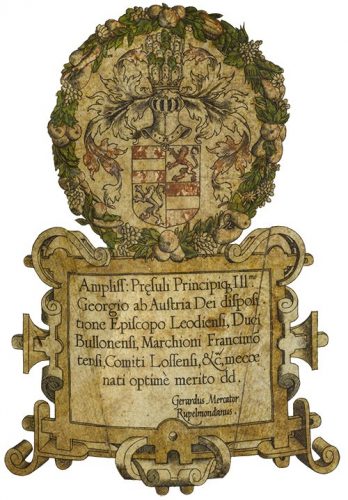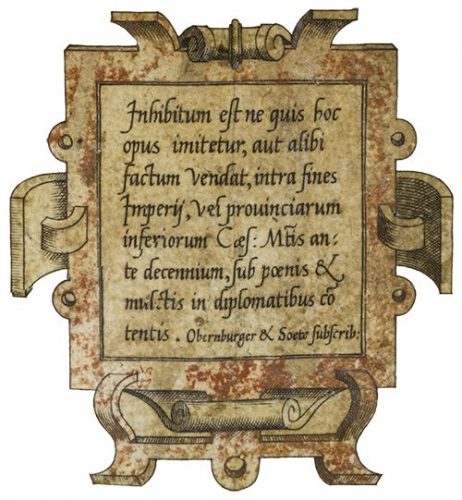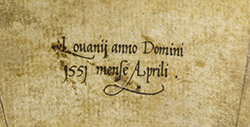The celestial globe has two insets, one a dedication and the other an intellectual property notice, along with an inscription of the place and date of publication.
DedicationIntellectual property noticePublication
The first inset contains a dedication to the Bishop of Liège under his coat of arms.
George of Austria (1505-1557), like Nicolas Perrenot on the terrestrial globe, was a great figure of his time. A natural son of Emperor Maximilian I, he began his ecclesiastical career in 1525 as Bishop of Brixen. In 1541 he was appointed Prince-Bishop of Liège by Emperor Charles V, who wanted a devoted clergyman in this strategic position.

Ampliss[imo] Praesuli Principiq[ue] ill[ustrissi]mo Georgio ab Austria Dei dispositione Episcopo Leodiensi, Duci Bullonensi, Marchioni Fracimotensi, Comiti Lossensi, etc, mecoenati optime merito dd. Gerardus Mercator Rupelmondanus.
Ampliss[imo] Praesuli Principiq[ue] ill[ustrissi]mo Georgio ab Austria Dei dispositione Episcopo Leodiensi, Duci Bullonensi, Marchioni Fracimotensi, Comiti Lossensi, etc, mecoenati optime merito dd. Gerardus Mercator Rupelmondanus.
To the greatest patron and very famous Prince George of Austria, Bishop of Liège by the grace of God, Duke of Bouillon, Marquis of Franchimont, Count of Looz, etc. and the most deserving of benefactors, Gerardus Mercator of Rupelmonde gives and dedicates this globe.
The second inset serves as a framework for the globe’s intellectual protection, stipulating that Mercator secured a ten-year ban on its imitation and sale.

Inhibitum est ne quis hoc opus imitetur, aut alibi factum vendat, intra fines Imperii, vel prouinciarum inferiorum Caes. M[aiesta]tis ante decennium, sub poenis et mulctis in diplomatibus cotentis. Obernburger & Soete subscrib[unt]
Inhibitum est ne quis hoc opus imitetur, aut alibi factum vendat, intra fines Imperii, vel prouinciarum inferiorum Caes. M[aiesta]tis ante decennium, sub poenis et mulctis in diplomatibus cotentis. Obernburger & Soete subscrib[unt]
It is prohibited for any person to imitate this work or to sell one made elsewhere, within the boundaries of the Empire or the United Provinces of His Imperial Majesty, for one decade, subject to the penalties and fines established by official documents. Signed Obernburger and Soete
Mercator also took care to indicate the place and date of the globe’s publication, an inscription that can be found under the tail of Pisces Austrinus, itself under the constellation of Capricorn.

Louanij anno Domini 1551 mense Aprili
Louanij anno Domini 1551 mense Aprili.
At Leuven in the year of our Lord 1551, in the month of April.


